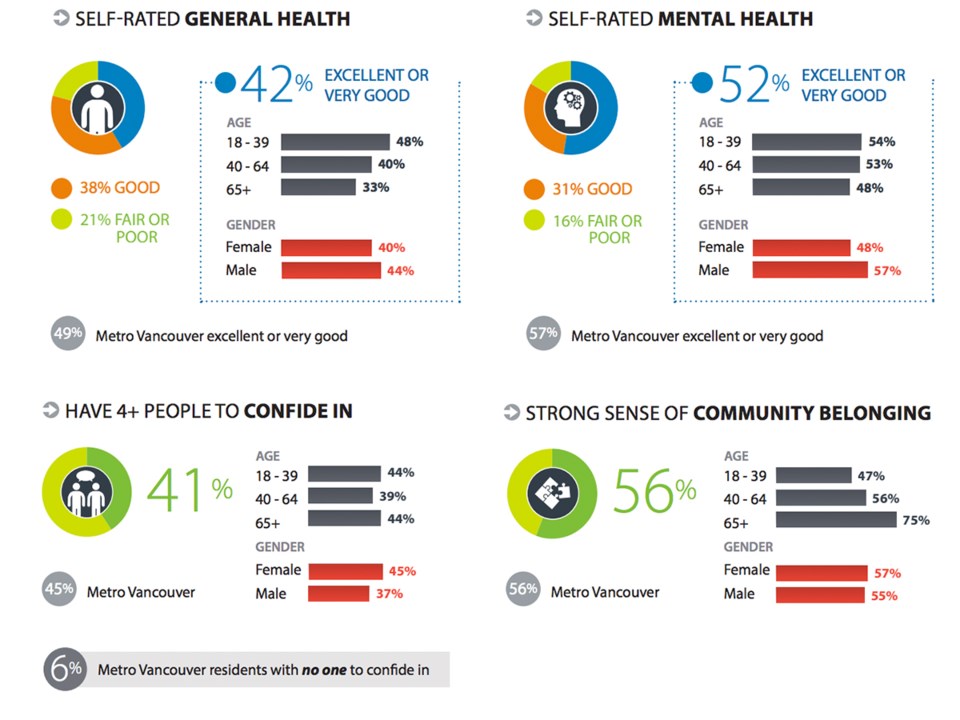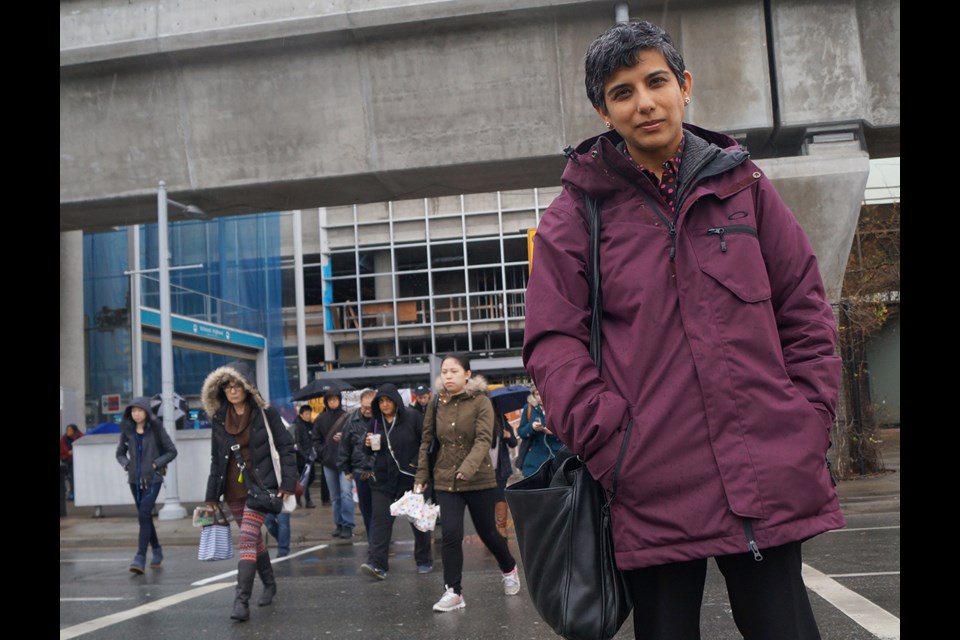Although Richmond is a city with one of the highest life expectancies in the world, its newly appointed medical health officer, Dr. Meena Dawar, is concerned Richmondites are disconnected from their community and, as a result, not as healthy as thought to be.
“Despite our high life expectancy, Richmond residents are reporting that they are not as well off and healthy as the rest of Lower Mainland residents and I think that’s an important issue to explore,” said Dawar, appointed to Richmond’s top public health position in September.
Only 42 per cent of Richmondites self-rated their general health as excellent or very good, whereas the Metro Vancouver average was 49 per cent, according to Vancouver Coastal Health’s community health profile survey, released last June.
One in five Richmond residents reported fair or poor health. Dawar noted self-rated health status correlates to objective health measures.
“So what that means is we’ve got a ways to go and there are health issues that need to be addressed.”
While Richmondites reported low rates of smoking and binge drinking, its “general health” status rated the worst in the region, in part due to low community connectivity, an issue Dawar wants to explore further.
“There’s a huge correlation between how connected we are with our neighbours, friends and family members and having people to confide in,” said Dawar.

According to the survey of close to 2,500 residents, 59 per cent of Richmondites do not have the four or more people to confide in that health experts believe are needed to maintain good health. The average in Metro Vancouver was 55 per cent. Dawar calls both numbers concerning.
As well, 44 per cent of Richmondites (the Metro Vancouver average) did not report a strong sense of community belonging.
“How do we keep people healthier so that we don’t see these numbers get worse but make them better?” asked Dawar.
She noted there are some easy fixes for Richmond residents, such as eating more fruits and vegetables — only one in five Richmondites report eating five or more servings per day (one in four in Metro Vancouver do).
Also, getting more physical activity is a must, said Dawar — just 37 per cent of Richmondites report getting the benchmark 150-plus minutes of exercise, while the Metro Vancouver average is 44 per cent.
Dawar also wants people to get out of their cars. While 70 per cent of residents agreed that community amenities are within walking or cycling distance of their homes, only 12 per cent do just that.
As well, 64 per cent of Richmondites commute to work by car, whereas the regional average is 55 per cent.
“This is a huge disconnect that we need to bridge,” said Dawar.
“I love the Canada Line, I wish it was extended more,” she noted.
Fixing Richmond’s sense of disconnect, however, will not be as easy as making lifestyle changes, said Dawar. For that, community stakeholders — such as the City of Richmond, Vancouver Coastal Health, non-profit groups, health professionals, community leaders and the public — need to continue working together.
Dawar noted Richmond has undergone large demographic shifts, which have impacted the community.
“Let’s embrace change, let’s embrace population growth, but how can we do that so we actually have better connected people, contributing to the community?” asked Dawar.
Medical sociologist Dr. Richard Carpiano studies public and population health at the University of B.C.
Carpiano concurs with Dawar and public health research, noting social isolation is not healthy. Relationships provide expressive support (confiding), information support (tips on a job) and material support (a cup of sugar), said Carpiano. Relationships can be deeply intimate (such as a spouse) or casual (a work colleague) but it’s community that binds them together into a “package of resources” that help one achieve day-to-day and long-term goals, thus maintaining good health, said Carpiano.
He told the Richmond News there are several factors at play that may be leading to a sense of disconnectedness in the city, a fact that has been shown in several other Richmond health surveys.
Immigration is an obvious factor, said Carpiano. “You’ve got people moving in, new residents that are transplants — so establishing those sorts of ties in a community is a very important thing. You also have a very diverse community where, in some cases, there are language barriers that can provide obstacles,” he said.
Since 1981, Richmond has lost roughly 22,000 Caucasian residents while it’s gained about 85,000 Chinese people. Meanwhile, its South Asian population has grown proportionately to population growth. Now, one in six Richmondites are born outside of Canada, making it one of the biggest ethnic enclaves in the country.
“Urban communities tend to have a lower sense of community connections and, of course, immigrants tend to be less connected,” noted Dawar.
Still, the impact of such unprecedented change on established residents should not be lost, added Carpiano.
“Then you’ve got people moving out, which poses implications for the longer-term residents and their connections,” said Carpiano.
Other demographic factors are at play as well, such as Richmond’s ageing population. Whereas in 2011, about 14 per cent of Richmond was over 65 years of age, in 2041 seniors will account for about 26 per cent of the city. Carpiano noted seniors are an at-risk group for isolation and/or having mental health issues.
As well, young people and young families who are feeling mounting financial burdens are also at a stage in life where depression can be found, said Carpiano.
Another shift in demographics that may be affecting connectivity is housing density.
During the past 10 years, Richmond has added on average 1,170 new apartments and townhouses annually while its single-family housing stock has seen little change.
Carpiano and Dawar both note that such accommodation lends itself to fewer community connections.
"So, Richmond does have an interesting pool of different groups that are at different stages of life or with different sets of social circumstances where they’re placed at risk for factors that could be undermining their mental health,” said Carpiano.
He noted that while changes might not “gel” with everyone, these “growing pains” can be overcome.
The Richmond News asked Richmond city councillors for their thoughts on the survey.
Three councillors responded.
Coun. Bill McNulty said he would take the results “with a grain of salt” as he believes Richmond to be a very healthy community.
However, he added, “It’s a red flag and it’s an opportunity to shore up our weaknesses.”
Coun. Carol Day said the rate of changes has meant some people losing their sense of community.
Coun. Alexa Loo said “connectedness comes from creating spaces for people to get together and interact. …Creating bylaws and rules about whether you have a tree or a fence does not create community and connectedness.”



